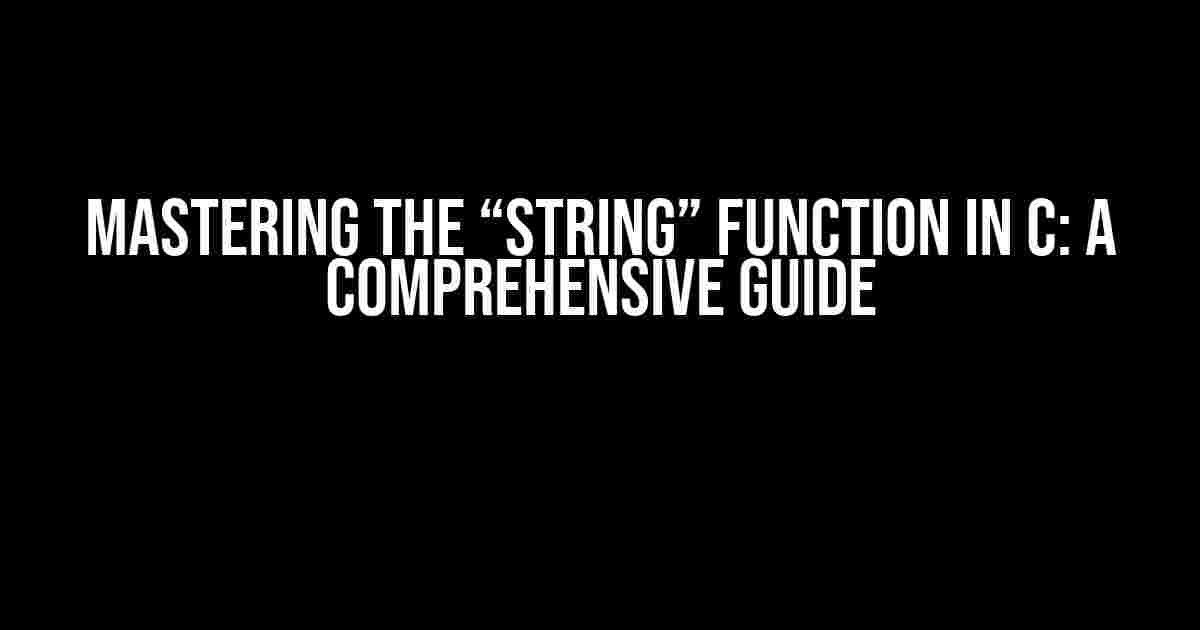Hey there, C programming enthusiasts! Are you tired of dealing with pesky character arrays and manually managing memory? Well, you’re in luck! The “string” function in C is here to save the day. In this article, we’ll dive deep into the world of strings in C, exploring how to use the “string” function with ease and confidence. So, buckle up and let’s get started!
What is the “string” Function in C?
The “string” function in C is a part of the standard library, providing a set of functions to manipulate and operate on character arrays, commonly known as strings. These functions allow you to perform various tasks, such as concatenating, comparing, and searching strings, making your life as a C programmer much easier.
Why Use the “string” Function?
So, why bother with the “string” function when you can manually manage character arrays? Well, here are a few reasons why using the “string” function is a great idea:
- Convenience**: The “string” function provides a set of pre-written functions to manipulate strings, saving you time and effort.
- Memory Management**: The “string” function takes care of memory management for you, reducing the risk of memory leaks and errors.
- Readability**: Using the “string” function makes your code more readable, as you don’t need to worry about low-level details.
- Portability**: The “string” function is part of the standard library, ensuring that your code is portable across different platforms.
Basic String Functions
Now that we’ve covered the basics, let’s dive into some of the most commonly used string functions in C.
strlen()
The `strlen()` function returns the length of a string, excluding the null character (`\0`). It’s a simple yet powerful function that’s used extensively in string manipulation.
#include <string.h>
int main() {
char str[] = "Hello, World!";
int length = strlen(str);
printf("Length of string: %d\n", length);
return 0;
}
strcpy()
The `strcpy()` function copies the contents of one string to another. It’s a useful function for duplicating strings or initializing a new string.
#include <string.h>
int main() {
char src[] = "Hello, World!";
char dst[20];
strcpy(dst, src);
printf("Copied string: %s\n", dst);
return 0;
}
strcat()
The `strcat()` function concatenates two strings, appending the second string to the end of the first. It’s a handy function for building complex strings.
#include <string.h>
int main() {
char str1[] = "Hello, ";
char str2[] = "World!";
char result[20];
strcpy(result, str1);
strcat(result, str2);
printf("Concatenated string: %s\n", result);
return 0;
}
Advanced String Functions
Now that we’ve covered the basics, let’s explore some more advanced string functions in C.
strcmp()
The `strcmp()` function compares two strings, returning an integer value indicating the result of the comparison.
#include <string.h>
int main() {
char str1[] = "Hello, World!";
char str2[] = "Hello, Universe!";
int result = strcmp(str1, str2);
if (result < 0) {
printf("%s is less than %s\n", str1, str2);
} else if (result > 0) {
printf("%s is greater than %s\n", str1, str2);
} else {
printf("%s is equal to %s\n", str1, str2);
}
return 0;
}
strchr()
The `strchr()` function searches for the first occurrence of a character in a string, returning a pointer to the character if found, or a null pointer otherwise.
#include <string.h>
int main() {
char str[] = "Hello, World!";
char target = ',';
char* result = strchr(str, target);
if (result != NULL) {
printf("Found character '%c' at position %ld\n", target, result - str);
} else {
printf("Character '%c' not found\n", target);
}
return 0;
}
Error Handling and Best Practices
When working with strings in C, it’s essential to follow best practices and handle errors properly to avoid common pitfalls.
Null-Terminated Strings
In C, strings are null-terminated, meaning they must end with a null character (`\0`). Failing to include the null character can lead to unexpected behavior and errors.
char str[] = "Hello, World"; // Missing null character!
Buffer Overflow
Buffer overflow occurs when a string is copied into a buffer that’s too small to hold the entire string. This can lead to memory corruption and security vulnerabilities.
char str[] = "Hello, World!";
char dst[5]; // Too small!
strcpy(dst, str); // Buffer overflow!
Memory Leaks
Memory leaks occur when memory is allocated but not released, leading to performance issues and crashes. When working with strings, make sure to free allocated memory using `free()`.
char* str = malloc(20 * sizeof(char));
strcpy(str, "Hello, World!");
// ...
free(str); // Don't forget to free the memory!
Conclusion
And there you have it, folks! Mastering the “string” function in C is a crucial skill for any aspiring C programmer. By following the guidelines and best practices outlined in this article, you’ll be well on your way to becoming a string manipulation master.
Remember, practice makes perfect, so be sure to try out the examples and experiments in this article to solidify your understanding of the “string” function.
Happy coding, and until next time, stay curious and keep on learning!
| Function | Description |
|---|---|
| strlen() | Returns the length of a string |
| strcpy() | Copies the contents of one string to another |
| strcat() | Concatenates two strings |
| strcmp() | Compares two strings |
| strchr() | Searches for the first occurrence of a character in a string |
Thanks for reading, and don’t forget to check out our other articles on C programming!
Related Articles
Here are 5 Questions and Answers about “How do you use the `string` function in C” in a creative voice and tone:
Frequently Asked Question
Get ready to unravel the mysteries of the `string` function in C programming!
What is the `string` function in C, and why do I need it?
The `string` function in C is a collection of functions that allow you to manipulate and operate on strings, which are essentially arrays of characters. You need it to perform tasks like concatenating strings, finding the length of a string, copying strings, and more!
How do I declare a string in C?
To declare a string in C, you can use the `char` data type, followed by the array size, and assign it a string literal using double quotes. For example: `char str[20] = “Hello, World!”;`. The number in brackets specifies the maximum length of the string, including the null character (`\0`).
What is the difference between `strcpy()` and `strcat()` functions?
The `strcpy()` function is used to copy a string from one array to another, replacing the contents of the destination array. On the other hand, the `strcat()` function concatenates two strings, appending the second string to the end of the first string.
How do I find the length of a string in C?
You can use the `strlen()` function to find the length of a string in C. It returns the number of characters in the string, excluding the null character (`\0`). For example: `int len = strlen(“Hello, World!”);` would assign `13` to the `len` variable.
Can I compare strings using the `==` operator in C?
No, you cannot compare strings using the `==` operator in C. This operator compares the memory addresses of the strings, not their actual contents. Instead, use the `strcmp()` function, which returns `0` if the strings are equal, a negative value if the first string is less than the second, and a positive value if the first string is greater than the second.


